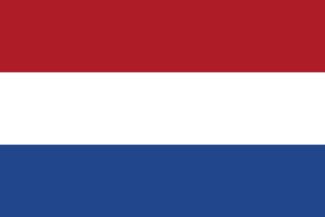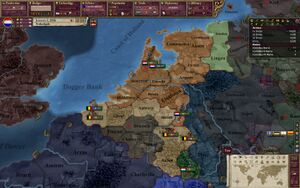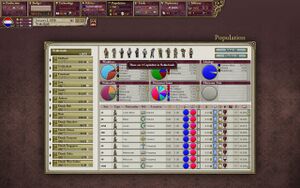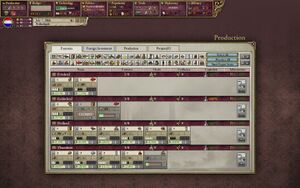小 (Spqrspidy移动页面Netherlands至尼德兰:翻译) |
无编辑摘要 |
||
| 第1行: | 第1行: | ||
{{version|Heart of Darkness}} | {{version|Heart of Darkness}} | ||
{{Country | {{Country | ||
|Government Type= | |Government Type= 绝对君主制 | ||
|Ruling Party= Conservatieven | |Ruling Party= Conservatieven | ||
|Capital= Amsterdam (ID 375) | |Capital= Amsterdam (ID 375) | ||
2021年3月19日 (五) 14:54的版本
| 尼德兰 | |
|---|---|
 | |
| 政府类型 | 绝对君主制 |
| 执政党 | Conservatieven |
| 首都 | Amsterdam (ID 375) |
| 人口 | 4.08 Million |
| 主体民族 | Dutch |
| 被接受民族 | Flemish |
| 识字率 | 58.9% |
| 国家价值观 | Order |
| 科研学派 | Traditional academia |
| 地位 | Secondary power |

Since the Early Modern Era, the Netherlands have been seeking prosperity at home by controlling trade overseas. Their ingenious merchants and shipbuilders drove innovation in different fields related to commerce: finances, credit, and colonization. This strategy led them to found great chartered companies that strove to establish colonial domains in America, Africa and Asia. After the Napoleonic Wars, the Dutch Government took full control of the colonies that once belonged to the VOC (Dutch East-Indies Company) and the GWIC (Dutch West-Indies Company).
At the 1815 Vienna Convention, the former Austrian Netherlands (which more or less now makes up ![]() Belgium) were annexed to the seven Northern Dutch provinces to make up the newly constituted Kingdom of the Netherlands. But by 1830, tensions had risen to such a point between the Protestant northern provinces and the Catholic southern provinces that a civil war lead to the secession of the Flemish and Walloon provinces and the recognition by the
Belgium) were annexed to the seven Northern Dutch provinces to make up the newly constituted Kingdom of the Netherlands. But by 1830, tensions had risen to such a point between the Protestant northern provinces and the Catholic southern provinces that a civil war lead to the secession of the Flemish and Walloon provinces and the recognition by the ![]() United Kingdom and
United Kingdom and ![]() France of the newly founded Kingdom of Belgium.
France of the newly founded Kingdom of Belgium.
The Netherlands did not officially recognize Belgium's independence until the Treaty of London in 1839, in which all of the great powers guaranteed their independence. Germany's invasion of Belgium in 1914, ignoring the "scrap of paper" which Prussia had signed, was a major reason for the entry of the United Kingdom into World War I.
Initial Position
In Europe, the Dutch territory is by all means modest compared to its immediate neighbours : ![]() France,
France, ![]() Prussia, and the United Kingdom. Outside of Europe, the Netherlands' colonial domain is, on the contrary, quite extensive: three islands in the Caribbean (Curaçao, Aruba within Dutch Zulia and Sint-Maarten in the Dutch Northern West-Indies), two provinces in Suriname (Guyana), and also several smaller coastal colonies in Africa. The bulk of its colonial empire, though, lies in Indonesia where the Dutch control the islands of
Prussia, and the United Kingdom. Outside of Europe, the Netherlands' colonial domain is, on the contrary, quite extensive: three islands in the Caribbean (Curaçao, Aruba within Dutch Zulia and Sint-Maarten in the Dutch Northern West-Indies), two provinces in Suriname (Guyana), and also several smaller coastal colonies in Africa. The bulk of its colonial empire, though, lies in Indonesia where the Dutch control the islands of ![]() Java, most of Sumatra, Sulawesi, the Moluccas, the southern part of Borneo and the western half of New Guinea as well as an handful of smaller islands.
In addition to its own lands, it is also the overlord of
Java, most of Sumatra, Sulawesi, the Moluccas, the southern part of Borneo and the western half of New Guinea as well as an handful of smaller islands.
In addition to its own lands, it is also the overlord of ![]() Luxembourg.
Luxembourg.
Actually, the Dutch initial position is quite historically inaccurate, as the Dutch only controlled small posts in the coast of Sumatra, Java and Sulawesi in 1836. most parts of these territories were not colonized before 1860.
The Netherlands main culture is Dutch but Flemish is an accepted culture. Javanese and Moluccan cultures are blended into the Kingdom's demographics although they represent the much more numerous colonial populations of Dutch Indonesia which are not taken into account for domestic politics. Throughout 1836, the Netherlands' overall position as a secondary power should oscillate between the 8th and 11th position with minimal input.
Economy
Unlike the United Kingdom, France, or the southern Netherlands (in 1836, Belgium), the northern Netherlands did not get an early start at industrialization. The economy is based off the output of farmers, labourers as well as the exploitation of more exotic and very lucrative resources RGO in Asia. The budget is stable and there is leeway for the government to back its first policies by borrowing from the Dutch National Bank if need be. Thus, the Netherlands do not start with a class of avid ![]() that could upstart the industrial revolution needed for the modernization of the economy. To do so, the Dutch government will need to rely on National Focus to nurture the first few homegrown Dutch capitalists.
that could upstart the industrial revolution needed for the modernization of the economy. To do so, the Dutch government will need to rely on National Focus to nurture the first few homegrown Dutch capitalists.
Another challenge to the growth of the Dutch economy is the relative low level of literacy even on home soil. This characteristic spoils the Dutch technological researches and must be corrected within the first few years so that the country doesn't lag behind its powerful neighbours.
Decisions and Missions
The only uniquely Dutch decision available for the player is to sign the Treaty of London that relinquishes Dutch cores on Belgium in exchange of prestige and better relations with the 8 Great powers and Belgium.
Buildup Strategy
From January 1, 1836, two main paths are set up for the Kingdom of the Netherlands: reabsorb Belgium or move on and make up for the losses elsewhere although both strategies are not mutually exclusive. The player might want to avoid signing the Treaty of London (so as not to lose cores on Belgium), but eschew any idea of a rapid reconquest of the southern Netherlands in order to weave a diplomatic web that would make British or French interventions less likely.
Strategy A (Annexing Belgium)
As the Netherlands start with a Casus belli, but one has to be aware that the United Kingdom will intervene because it considers the rebelling state as part of its sphere of influence. In all probability, Prussia will offer the Dutch government an alliance in the first few days of January 1836, and in the interest of fending off a British and/or French intervention, it is best to accept it. It is also possible to seek an alliance with both the United Kingdom and/or France within the first few months, but, Netherlands have relatively bad relations with both countries.
Other alliances can easily be struck with ![]() Austria or
Austria or ![]() Denmark but in any case, the player must make allies before declaring war on Belgium. Throughout the conflict, the Dutch government will need to borrow large sums of money in order to provide the army with enough supplies, the player will be able to deal with debt repayment once the conflict is over. Still, one has to keep track of loan interests so that they do not overtake the State's overall budget and push the Dutch government in to defaulting. Moreover, once the Belgian industries are (once again) apart of the Dutch Kingdom, Wallonian and Flemish capitalists will jumpstart the creation of factories in Holland, Gelderland and Friesland.
Denmark but in any case, the player must make allies before declaring war on Belgium. Throughout the conflict, the Dutch government will need to borrow large sums of money in order to provide the army with enough supplies, the player will be able to deal with debt repayment once the conflict is over. Still, one has to keep track of loan interests so that they do not overtake the State's overall budget and push the Dutch government in to defaulting. Moreover, once the Belgian industries are (once again) apart of the Dutch Kingdom, Wallonian and Flemish capitalists will jumpstart the creation of factories in Holland, Gelderland and Friesland.
The Belgian forces are strong enough to match the Dutch army so mobilizing the Dutch reserve isn't a luxury the player can do without.
The best tactic is to wait for the Belgian forces to attack. As months pass by, a British landing in Holland, Zeeland, or Bruges is very likely so stationing Dutch brigades on these coastal provinces isn't advisable although occupying Bruges should be one of the player's first concern. When the British try their hand at a seaborne invasion, the Prussian forces will most likely help in driving them back to the sea. As Belgium's occupation is complete, annexation of the rebelling provinces will be possible, but the war will most likely drag on for a few months if not years with the United Kingdom.
Waging naval war on the British navy will only lead to annihilation of the Dutch squadrons, so it is best to leave them in port. Most likely, British forces will land and occupy some of the lesser Dutch colonies : Suriname in South America, the Western half of New Guinea, Bali, Sulawesi, or even Sumatra. Recruiting Indonesian troops in provinces where manpower allows it might also help Dutch colonials in defeating any tentative British invasion in Indonesia. Down the line, Prussia might be able to secure a White peace with the United Kingdom or, if the Dutch State need to pacify London in a quicker fashion, it may offer cession of Dutch Guyana (Suriname) or any other inconsequential colony in Africa, for example.
Once order is restored in Belgium and peace has been reached with the United Kingdom, the Dutch government has to be wary of a French declaration of war. Paris will most likely seek to add Wallonia and/or Flanders to its territory (or force the Dutch State to release Belgium/Wallonia/Flanders) if the Franco-Dutch relationships are not warming up by then. Keeping up with the Prussian alliance might well be the solution to avoid losing back the southern provinces. On the other hand, a unified Germany could prove to be an even bigger threat than France so the Netherlands might want to play both alliances to maintain a continental equilibrium in Europe.
Strategy B (Ratifying the Treaty of London)
War at home might be too much for some players that want to follow a less risky and more historical path. In this case, up-starting the Dutch industrial revolution is the first challenge of the Dutch government. The Conservatives in power (Conservatieven) allow the player to assist in funding industrial projects crafted by the capitalists.
In order to have some of these projects off the ground, though, the Netherlands must use their National focus to promote a homegrown class of capitalists. The Holland Region or State, by being the most densely populated area of the Netherlands is a prime contender to be the target for such social experiments. Once construction of the first factory is underway, the National focus must be switched to encourage Holland's farmers and labourers to convert into craftsmen (and later on, clerks). In turn, these capitalist from Holland, Zeeland and Utrecht will fund the construction of railways across the country, and set up industries in Gelderland or Friesland.
Moreover, one of the urgent challenges that the Dutch government must tackle is the low literacy of its population compared with France, Scandinavian nations, or especially German minors (this is especially true if Belgium was brought back into the fold as both Flemish and Wallonian populations suffer from anemic levels of literacy). In order to put Dutch research on the fast track, the government will need to promote education by funding it properly (over 90% on the Budget screen), promote clergymen with the use of the National focus, and target specific cultural technologies like Idealism or Positivism. Once each European Dutch regions sports more than 2% clergymen, the National focus can be put to other uses.
Indonesia's RGOs will come off as very profitable early on. One might at to those, by taking ![]() Johore with (precious metals) and colonizing Alor (tropical wood). Starting in the 1870s-1880s, some of the Indonesian provinces RGOs will switch to produce oil which won't be of much use before it can be converted into fuel and then bought for civilian and military motorized vehicles. In any case, the Netherlands are poised to become in the late 19th Century, a top producer of many novel industrial and consumers goods.
Johore with (precious metals) and colonizing Alor (tropical wood). Starting in the 1870s-1880s, some of the Indonesian provinces RGOs will switch to produce oil which won't be of much use before it can be converted into fuel and then bought for civilian and military motorized vehicles. In any case, the Netherlands are poised to become in the late 19th Century, a top producer of many novel industrial and consumers goods.
It is important to subsidize the continued existence of the first few Dutch industrial productions whilst researching industrial and commercial technologies to improve the efficiency of their production to keep the Dutch industrial complex within the top 8 industrial nations because prestige or military might be harder to get by. To this end, Conservatives need to be kept in place at least long enough until workers can switch easily between factories if one's production takes a temporary turn for the worse and avoid mass unemployment that, in turn, targets immigration out of the country. The Liberal parties (Liberale Partij, but also the Rooms-Katholieke Partij if you have annexed Flanders) and Anarcho Liberals will not tolerate the government mingling in the economy and subsidizing or funding industrial activities directly will not be possible. On the contrary, to remain solvent, the Dutch government must make sure that subsidies are employed only as a temporary measure and are not putting the State's finances in shambles for too long (more than 12–24 months).
Strategy C (Remove the british influence in Belgium before the attack)
If one wants to annex Belgium, but sees the British's armies as a too big challenge, one can try to raise to Great power and raise to friendly status in Belgium, without signing the treaty. This way one can remove Great Britain as sphere leader and then attack Belgium. Belgiums armies alone is quite easy to defeat without British intervention. If one is lucky, Belgium will raise to Great power itself or fall to a revolution, which will result in that the British influence is lost and Belgium will be open for an assault. Be wary that even after UK has lost influence in Belgium they can still share an ordinary alliance.
Strategy D (Annexing a part of Belgium and ratifying the Treaty of London)
Annexing Belgium will certainly guarantee the Netherlands to become a great power; however, many other great powers such as France and Britain will likely to be hostile toward Netherlands. Ratifying the Treaty of London will surely demote the Netherlands from being a great power statues and get influenced by the other great powers. Thus, it is a common dilemma for neophyte and many players. Yet, there is a secure way for the Netherlands to become a great power and maintain good relationships with other powerful nations: Annexing a part of Belgium and ratifying the treaty of London.
Annexing a part of Belgium: Right from the start, it is crucial for the Netherland to ally with Prussia. Then, wait until France declares war on Britain and wipes out the Belgium army or just declare war on Belgium with Prussia by using the restore order casus belli(Do not use any other casus bellis). After short and intense battles with Belgium, it will eventually surrender itself toward Netherlands. Accept Belgium’s surrender, wait for few months, and give up a part of Belgium (whether Wallonie or Flanders) toward Britain. By giving up just one Belgium territory toward Britain, the Netherlands will be able to end the war quickly with Great Britain and retain or maintain the great power statues.
Ratifying the treaty of London: After the Netherlands has gained a part of Belgium, it is time to promote neutrality and harmony with other great nations. Quickly restore relationships with Great Britain and sign the treaty of London. By accepting the treaty, the Netherlands will be able to maintain good relationships with neighboring great nations
So, what happens next?
The Netherlands must seek to expand her colonies in Asia and Africa, in order to maintain its status as a powerful nation. Demand concessions from Morocco and other African countries and later, annex as many African countries as possible. Establish protectorates in Asia by invading ![]() Atjeh, Dai Nam,
Atjeh, Dai Nam, ![]() Siam,
Siam, ![]() Brunei, and other southeast Asian countries.
Brunei, and other southeast Asian countries.
During the expansion process, many neighboring countries will often request military access. It is crucial for the Netherlands to accept every military access request as they increase relationships with other countries. In this way, great powers like Austria and France will be likely to offer alliances.
Don’t be reluctant to rely on your allies, because the Netherlands(even if all of Belgium is annexed) is a small country. Even if the Netherlands manages to colonize the majority of Africa, it will still require much assistance from other nations. A possible next step is annihilating Russia with France and Austria, as they are powerful allies. An alliance with Sweden could help start a war with Russia, as Russia declares war on Sweden regularly. Because defeating Russia will prove difficult, the Netherlands should call Austria and France into the war. As result, the Netherlands would have two strong allies, Austria and France, against Russia.
Colonization of Africa
The Netherlands starts with a big deficit of colonial points, meaning that it must either expand its coastal Regions in Europe (most easily by annexing Belgium) or release Asian holdings to gain enough colonial points to expand much more.
The player may decide to release Java to free up colonial power. If this is done while the Netherlands is a great power, Java will enter the Netherlands' sphere of influence. One can also invade a minor European nation like Denmark for its shores.


